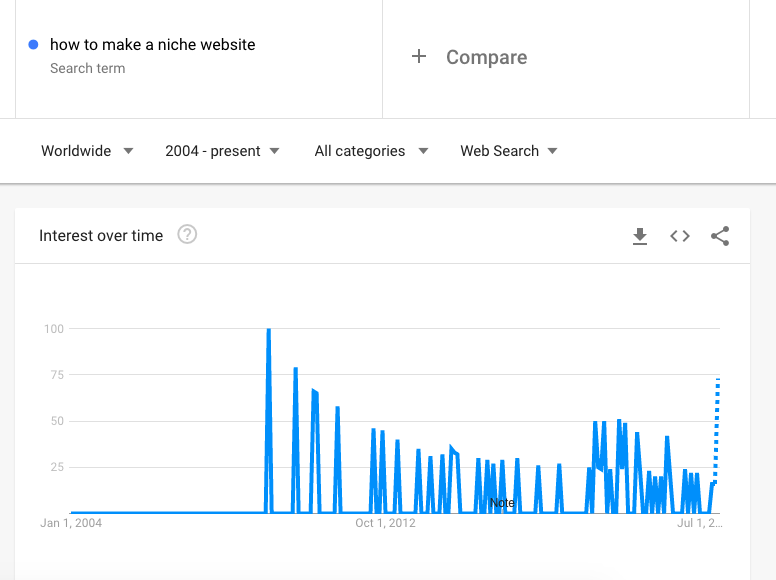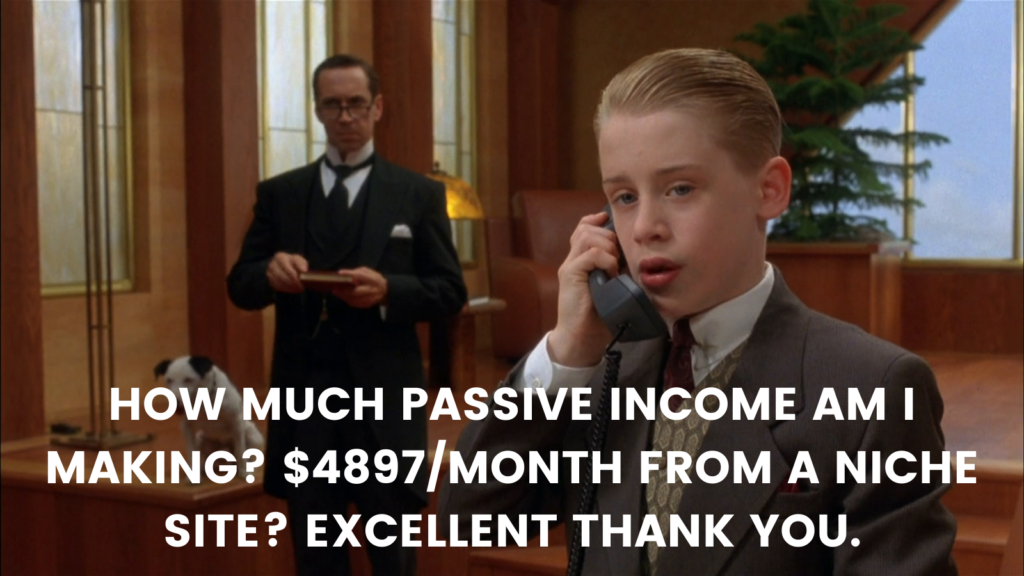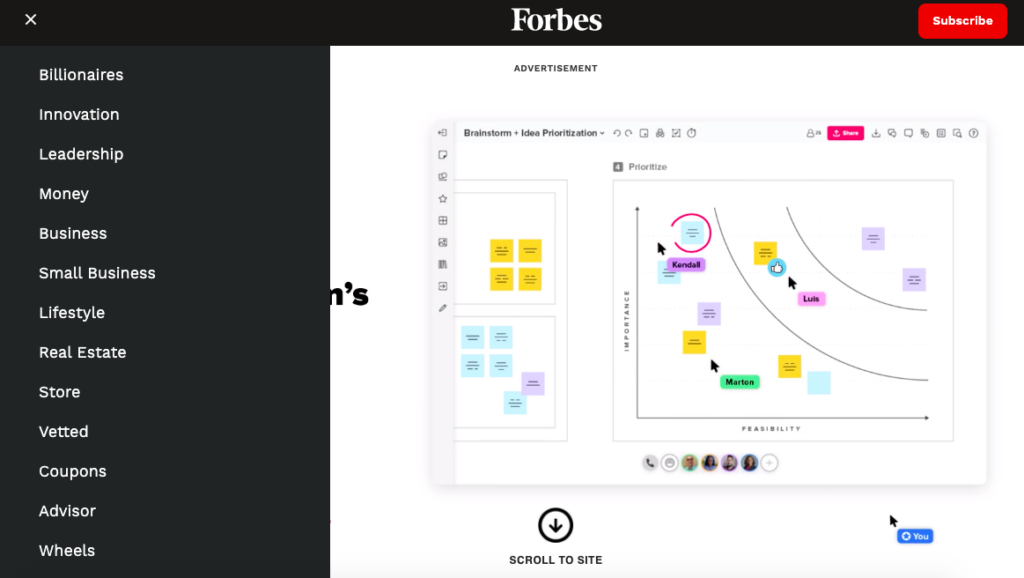If you’ve been paying attention to blogging trends at any point over the past 10 years, you’ve heard of a niche site.
Since ~2009, the concept of a niche site has become more commonplace—along with the desire to build one:

I’m guessing you’ve probably seen examples from successful niche website owners who have made it their business to teach others how to build and monetize “your own niche site and be earning $4,897 per month in passive income!”
Unfortunately, like any endeavor that promises easy, “passive income”, there’s always another side to the coin.
As a digital content professional who’s built niche websites from the ground up with BWZ, I know that building niche sites is both fun and difficult.

Niche sites aren’t your one-way ticket to richie rich town.
However, niche sites are a way to deliver (and potentially monetize) content, and it can be a fun challenge and a cool way to build your authority in a niche and develop an audience or community who share the same interests.
To help get you started in the world of niche sites, here’s my take on this popular blogging style. This article will help you understand what a niche site is and what you can expect if you’re going to start one.
- What Is A Niche Website?
- Why Build A Niche Site?
- Other Names For Niche Sites
- What To Expect When Creating A Niche Site
What Is A Niche Website?
A niche website is a website that focuses on a specific topic, product, service, or audience. This type of site, done well, provides immense value to readers because, while it might not have broad coverage, the topics it does cover are usually covered in greater depth than a more generalist site.
An example of a niche site is the one you’re on right now—Indie Media Club. This website has a tightly defined target audience (leaders of high impact, 7+ figure media businesses who are passionate about great content and thriving communities).
An example of a more generalist site would be Forbes.com—check out Forbes’ menu on the left of this screenshot:

When you really think about it, content websites (those focused on delivering content rather than acting as a platform or marketplace) pretty much all fall onto one or the other side of the tracks.
Either a website is focused enough to be considered a niche site, or it’s too general to be considered a niche site. There’s no quantifiable or technical definition of a niche site—you have to use your judgement.
Here are some examples of niche sites:
- A geographical niche like Maine Homes, which covers real estate, homes, gardens, and antiques in Maine.
- A professional interest group site like The Product Manager, which covers career topics for product managers.
- A hobby site like Banjo Hangout, a site for banjo players that’s more centered around user-generated content through its forum and member-created media library.
By contrast, here are some websites with broad enough coverage that I would not consider them to be niche sites:
- Huffington Post and other news sites with broad coverage.
However, a news site with really narrow, specialized coverage could be considered a niche site—Montana Angler is a good example of that, as it’s a news-style site that covers fishing news in Montana
- Ebay and other marketplace sites.
You could argue that some other marketplace sites appeal to a specific niche, such as Etsy, which focuses on handmade creative goods. For our case, I’m not considering something like Etsy a niche site because, in practical terms, the requirements to run a successful marketplace are different from what you need to run a niche content site. I guess you could argue that Etsy produces a niche blog as part of its overall content strategy.
Why Build A Niche Site?
Building a niche site is challenging—it doesn’t always work out, and it requires an ongoing investment of time and resources—but it can be rewarding, too.
It Can Pay Off In The Long-Term
Google’s algorithm, more and more, gives preferences to websites with trustworthy, authoritative, and expert coverage of a given topic—so, in a way, Google likes to rank high-quality niche sites. Investing in making specialized, useful content for your niche’s target audience can be a good investment over the long term, resulting in organic search traffic for months and years down the road (with some maintenance involved!).
It’s A Way To Build Authority And Influence In A Field
Building a niche site is also a great way to establish credibility in a field if you want to make a name for yourself in your area of expertise or passion.
You Can Monetize It In Many Ways
And as long as you keep the right readers or viewers coming to your content, developing a targeted and specific audience, you have the ability to sell to this audience or to allow advertisers to sell to them. This is monetizing your site, which we’ve talked about a lot on the Indie Media Club podcast.
We live in a market society right now—it feels like everyone is selling something. It’s hard to make great content that people love and trust, so if you can nail it, others who are trying to appeal to your audience with products or services will want “in”. They’ll pay for access to the audience you’ve built up, whether that’s through affiliate products, advertising, sponsorships, or other monetization options (you’ll want to present these in a media kit).
Lastly, even if you can’t effectively monetize your site through sponsorships, you might be able to recoup your investment by building and selling your niche site. If you’ve built traffic to your content, it’s possible that someone else (a bigger fish) in your niche will want to simply buy your entire site and all its content.
People buy sites for all sorts of reasons—for the organic traffic, for the content, for the backlink profile, for the subscriber list—so even if you don’t want to monetize your site on an ongoing basis, you could sell it.
Related Read: The Seller’s Storybook; Or, The Grand Purpose Of A Media Kit
Other Names For Niche Sites
There are a few different names for niche sites. Some people think that all of these terms are interchangeable:
Niche site = microsite = micro-niche site = micro niche website = content site = authority site = blog = affiliate site
I agree—except for “blogs” and “affiliate sites”.
Here’s why they are different and why I think it’s important to make a distinction between them and niche sites:
Blog Vs Niche Site
Although it’s common to just say “blog” when you’re referring to a website, a blog is actually a structural part of a website. It’s the part of the website that has posts (usually articles). Whatever CMS (content management system, such as WordPress) you’re using, there’s usually standard taxonomy for blogs that includes using categories and tags to show relationships between each blog post and page.
It’s fine to casually call your website a “blog”, and many people do, but I just don’t think a “blog” is a totally separate type of website from a niche site. A blog is a structural part of a website, including niche sites. In fact, a blog is a really important part of getting traffic to your niche site (more on that later).
There are those who distinguish niche sites from blogs, saying that the difference lies in the different tactics they use to get website visitors (niche sites relying on organic search traffic while blogs rely more on social media or referral traffic), as well as different breadth/depth of topic coverage (niche sites being more focused and blogs being more broad).
I just don’t think that makes sense.
Affiliate Site Vs Niche Site
In my eyes, “affiliate” in this context is more an approach to monetizing your blog, rather than a different type of website. Sure, “affiliate” can be a type of site if you want to call your site an affiliate site or affiliate niche site (Doug Cunnington does, and runs a lot of successful affiliate sites!), but more often, earning affiliate income through affiliate marketing (featuring affiliate products on your blog) is just one of the ways you’re monetizing it, not the only way.
That said, to successfully get traffic to a website that plans to make money off of promoting affiliate products, you usually need to niche down a bit anyway. Your recommendations for products mean more when it’s clear that your publication specializes in a particular niche—when it’s clear that your recommendations are trustworthy because you know the space.
To sum up, a site that makes money from affiliate products often is a niche site—just with affiliate monetization.
Niche Site Vs Microsite Vs Content Site Vs Authority Site—Is The Difference Important?
When you get started in the space, you’ll see a lot of examples where people distinguish between niche sites, microsites, content sites, and authority sites.
I argue that knowing the difference between any of these terms is not important when creating a niche site.
Why?
Because the difference between these types of sites isn’t meaningfully different—it wouldn’t make me change my strategy if I’m trying to build one type of site vs. another.
Even so, if you look on other blogs, you’ll find all sorts of fine lines people are drawing around these website types.
For example, I’ve heard people say that microsites are different from niche websites because microsites focus on a smaller topic within the niche. For example, your niche site focuses on “health cooking” and a separate microsite focuses on “healthy cooking with homegrown vegetables”.
There are those who say authority sites are different from niche sites. They say that niche sites can only have 10 to 50 posts about commercially viable topics and are more likely to be monetized through affiliation, while authority sites have no ceiling for the number of posts on them, can be less commercially minded, and more informationally-minded, and have more robust monetization.
Honesty, I find distinctions like the two examples above to be really arbitrary. I wouldn’t bother trying to distinguish between niche sites, microsites, content sites, and authority sites because I can’t find a useful reason to try and distinguish between them.
Knowing that you’re running a microsite vs a niche site probably won’t change your strategy. Either way, you’ll probably produce a lot of content for your target audience with the goal of ranking in search engines and getting organic traffic.
Likewise, the lines between these types of sites are super flexible—you can expand your topic coverage, try new and multiple styles of monetization, un-publish and re-publish posts, etc. It’s the web! Most people in the niche site game have far more than one iron in the fire, and they’re experimenting with a combination of content production, promotion, growth, and monetization tactics.
What To Expect When Creating A Niche Site
I’ll talk about what to expect when creating a typical niche site—a website that’s designed to get organic traffic from a narrowly defined audience.
Expect To Learn A Lot About Seo
SEO (search engine optimization) is usually a huge part of running a niche site. To get organic traffic, you usually produce high-quality content optimized for search engines so people will discover your content when they search for it.
Organic search content is a great tactic because it is straightforward to research, and once you’ve invested in making it, you can keep getting traffic from it for a long time (with some maintenance).
So, expect to learn a lot about SEO. If you find it interesting and fun, then building a niche site will be a lot of fun for you.
Worth Checking Out:
- 10 Best Website Content Optimization Tools To Outrank The Competition [2023]
- 10 Best SEO Tools For 2023
Expect To Invest A Lot Into Making Really Good Content
The technical steps of setting up a website don’t have to take very long (maybe a week?), but actually building it and keeping it running requires regular, ongoing investments—you gotta make your content. Specifically, you have to make the content your audience is searching for, and you have to deliver it well.
There are a lot of sites competing for eyeballs because they know that content marketing is an effective way to get qualified viewers on your site. Your content has to stand out.
In my opinion, the only true make-or-break for running a niche site is the content. I bet you could successfully build and monetize a niche site in any niche—the trick is not necessarily in finding the right niche or monetization strategy. The trick is in making the best content that attracts, engages, and retains an audience—and then figuring out how to make that content at an affordable rate for a long time.
So, if you love making content (writing, making visualizations, filming videos, etc), then you’ll probably have fun building a niche site. If you don’t like making content, then you’ll want to find people who do and pay them for it.
Expect It To Take A While To Pay Off
Since making high-quality stuff takes a while and ranking in search engines takes a while, expect it to take a while to see the fruits of your effort.
Building a niche is like building a little business, and you have to be patient to wait for the payoff from an organic content strategy. First, you’ll see some keyword rankings, then you’ll see some traffic, and only after you’re seeing traffic will you start being able to really monetize your content.
How long does it take?
That really depends on what you want out of your niche site, but here’s an example of one of our niche site’s traffic data to show you what we achieved in ~1.5 years:

A lot of our growth curves for organic content sites look like the graphs above. Often, there is an almost flat line for about 6 months, and then a steep upward curve begins to form. We usually don’t start seeing the payoff from our content until we’ve developed enough of an ecosystem that we’re seen as a trustworthy authority on the niche. Once we hit that point, we start to see more and more of our content rank quickly.
Expect it to take a while! It’s more of a long-term game, in my experience.
Running A Niche Site Is Challenging
Running a niche site can be a fun and rewarding experience. It’s a challenge to get it right, and it takes a while to see your content rank in organic search, but it’s really valuable to build a highly targeted audience that you can monetize in multiple ways.
We talk about building niche sites a lot on the Indie Media Club podcast, so head over there to listen to interviews with successful digital media entrepreneurs and learn their tricks for making and monetizing digital content. Here's a good one to start with: How To Build The World’s Largest Theme Park Fan Site
Also Worth Checking Out:


